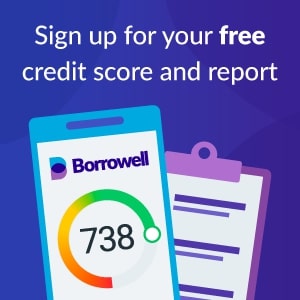Last Updated on August 4, 2021 by Yetty Akindele
It is amazing that quite a large number of people still don’t understand how credit scores work. According to CNBC about 4 in 10 Americans have no idea how their credit score is calculated.
People tend to view credit score calculation as intimidating. I have lots of friends who have a hazy idea of how boosting their credit score works.
The saying ‘if you don’t know the value of something, abuse is inevitable’ is so apt when it comes to credit scores. You simply will not get it right if you do not understand how it works or the many benefits this singular score gives your overall financial health.
As a new immigrant to Canada, I found this use of credit cards and minimal cash a bit weird.
In my home country, cash and debit cards are the calls of action for daily purchases. I did not have to think of improving some financial metrics (credit score) so I can get great deals on purchases.
However, my curiosity for taking control of my finances lead me to do as much research as I could on credit scores.
Table of Contents
What benefits do you stand to gain with an excellent credit score?
Your credit score paves the way for you to get easy approvals for loans or new lines of credit at lower than normal rates. Some homeowners also check your credit score before renting their property to you.
These are just a few examples of the edge an excellent credit score gives you over others looking for the same deals as you.
In this post, I share a couple of things you can do to build your credit score from no credit history to as high as 850. Yes, 850 is an achievable score, you just need to have an understanding of the ‘what to do’s and what nots’.
You should also note that achieving this takes time as well as discipline.
At the most rudimentary level, these are some of the basics you should know;
- Always make sure that your bills are paid, and that the payments are made in time.
- Never pay the minimum payment of $10 as usually stated by most credit lenders. If you make it habitual, it will take you years to pay back accumulated credit balances.
- If you cannot afford to pay back in full, make sure to pay back at the least your statement balance. However, be sure that the statement balance payment ensures your credit utilization level is less than or equal to 30%.
- Maintain your old credit card accounts. Limit application for new credit cards especially ensuring not to apply for too many at the same time.
Now that you understand the basics, let me delve into the steps you need to take to increase your credit score to 850
1. Habitual Review of Credit Report
Your credit report details all about your credit. Reviewing it can help you to identify what you already do that helps to boost your score. Similarly, it can also help you detect what you do that negatively impacts your score.
You can get a free copy of your credit report once a year from Equifax and Transunion. There are also other ways to get a free copy of your credit report with monthly updates.
You should review your credit report habitually and identify what could be hurting your credit score. Make the necessary adjustments, give some time, and watch your score improve.

Similarly, reviewing your credit report can help identify erroneous entries in your file which could be hurting your score. If you do detect such errors, report it and have it deleted from your file.
Other factors that can impact your credit score negatively are; high credit balances, missed or late payments, and multiple applications for new lines of credits.
2. Automate Bill Payments
Generally, there are about 5 factors that are considered in the calculation of your credit score. As an example, Equifax uses the following factors;
- Payment History (approx. 35%)
- Used credit VS Available credit (approx. 30%)
- Credit history (approx. 15%)
- Public records (approx. 10%)
- Inquiries (approx. 10%)
The section of your credit report that has to do with missed or late payments is the Payment history. As indicated above, this is the category that accounts for the highest percentage (35%) in the calculation of your credit score.
Hence, it will have the most impact on the calculation of your credit score. This section looks at your creditworthiness in terms of how you made repayments of previous credits awarded such as credit card payments, mortgage payments, student loans, etc.
To prevent missed or late payments, I would advise you set up some form of automated monthly payments or reminder in your calendar. You can also set up an alert within your online mobile banking platform for when your Credit card payment is due. This will ensure that you always make your payments in time as well as preventing missed payments from your being forgetful.
Remember, if you forget to make a payment due, your credit scoring model doesn’t forget to make your score calculations! Be proactive!
3. Always strive for ≤30% credit utilization
Credit utilization in lay man terms simply means the proportion of available credit used. This is the second highest impacting criterion after Payment history.
The best way to keep your credit utilization ratio within the desired percentage of less than 30% is to ensure payment of your credit balances in full at the due dates.
However, if you cannot afford to do this, then at the very least, ensure to pay your statement balance. Do this only if paying the statement balance will ensure you are keeping your credit utilization ratio below or equal to 30%.
To improve your credit score, while a 30% utilization ratio is a general benchmark, you should aim for 10% or less for a good positive impact on your credit score calculation.
If you are a minimalist spender, another way you can improve your credit utilization will be by asking for a credit limit increase. Sometimes, your bank or lender might even give you that option without you asking.
Using this strategy as a way to improve your credit utilization will only work if you do not abuse the increase in the amount of money you now have access to. Otherwise, the purpose will be defeated.
4. Maintain Old Accounts
You should keep your old credit accounts open as the credit age portion of your score calculation considers how long you have had your account.
Closing a credit account also means losing the credit history associated with that account. Generally, the older your credit history, the more appealing your credit file is to lenders.
Don’t forget, your credit utilization ratio, takes into consideration all of your available credit-limit from all cards. If you have credit card accounts you want to close because you are not using them, then your available credit-limit also reduces.
This could potentially increase your credit utilization ratio if you have credit balances on other open credit cards.
5. Minimize your request for New credit and any form of Hard inquiries
Whenever there is a request by you for some form of new credit, the lender pulls your credit report. This registers a hard inquiry on your credit profile which will affect your credit score negatively.
There are 2 types of inquiries; a soft check, (usually that done by you) which does not affect your credit score, and a hard check (usually done by lenders) which will affect your credit score negatively.
Therefore, to minimize any hard inquiries, you need to limit your requests for new credits such as applying for multiple credit cards at the same time. Some other credit applications to be mindful of are mortgage applications, auto loan applications etc.
Don’t apply for a mortgage at the same time you just applied for a new credit card. If you do have to apply for both services, allow some time to pass before you do.
Similarly, while having a mix of credit cards could be a good thing, do not apply for multiple credit cards at the same time. You come across as having a financial crisis if you apply for credit cards from different lenders at the same time.
6. Make plans to pay off debt accrued from Missed payments
You might have credit card debt that accrued from missed payments. To solve this, first take out time to understand exactly how much it is that you owe, and decide on a payment plan. You should also make plans for how to make future payments as well.
If you would like help with credit card consolidation, you can make use of the services of Loans Canada. This is a platform available in Canada that offers this service and has helped hundreds of thousands of Canadians with their services.
7. Public Records/Collections
If you have a history of bankruptcy, collection issues, or some other derogatory public record, this could be a major detractor to lenders in terms of your creditworthiness. You would want to take measures to ensure you correct these issues.
One of such measures you can take could be done with the services of Debt rehab, a platform that offers bankruptcy services.
8. Keep track of your progress by using credit monitoring services
Maximize the benefits of credit monitoring platforms such as Borrowell and Mogo in Canada. With these platforms, you can access your credit score for free via a soft check which does not hurt your score.
This way you are able to track if your efforts to improving your credit score are effective. With these platforms, you get your free credit score from either Equifax or Transunion with monthly updates all risk-free.
At the time of writing this article, Mogo is the first and only platform to offer free identity fraud protection to its members in Canada. This is in addition to its free credit monitoring service.

In conclusion, while it can take several weeks or a couple of months to improve your credit score once you start doing things right, it is never too late to put in the right measures. The benefits of having an excellent credit score such as lower interest rates for mortgages or auto loans makes putting in this effort worthwhile.
It is my hope that you have found this post helpful and that you will set out to apply the recommendations stated here to improve your credit score.


